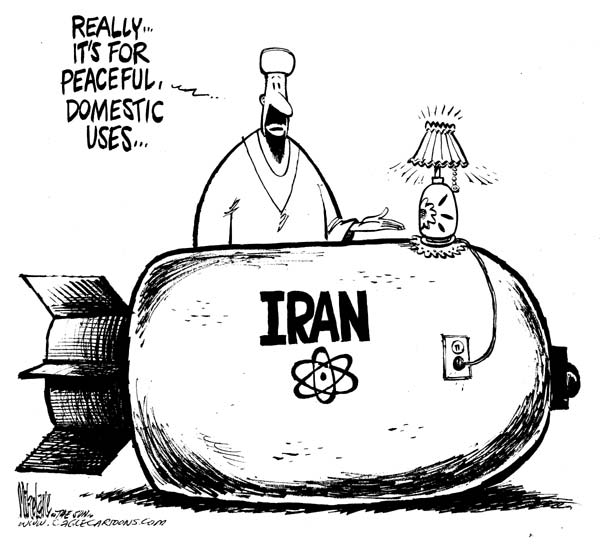
Iranian possession of nuclear weapons not to be taken lightly
August 24, 2014
Since the 1950s, Iran has been pursuing nuclear enrichment capabilities. The original program was started with assistance from the United States prior to the 1979 Islamic Revolution. Now, in post-Revolution days, Iran continues to enrich lower grade Uranium, and according to the United States’ intelligence community, is actively researching nuclear weapons. Iran maintains that the research and enrichment is for peaceful purposes such as sustainable energy.
Following the 1979 Revolution, the United States pulled out of the Iranian Nuclear program, and imposed economic sanctions on the country while pressuring others to do the same. Iran quickly reached out to the Soviets, an alliance that continues with the current Russian Federation. Even with this partnership, Iran has repeatedly signed treaties with European nations allowing the International Atomic Energy Agency (IAEA) to inspect their centrifuges, reactors, and other facilities.
In the closing years of the 20th century and the early 21st century, the United Nations (UN) at the behest of the United States, has continued to impose tighter and tighter sanctions on the Iranian economy. These sanctions freeze foreign Iranian assets and embargo oil exports. Even throughout these stiff sanctions and embargoes, Iran has begun to escalate their nuclear program. In fact, according to the IAEA, Iran has more than tripled its number of generation two nuclear centrifuges in the past three months, leaping from 689 to 2,100. This jump in nuclear enrichment has caused two of the world’s foremost weapons experts to lay claims to what is really happening in Iran. Rolf Ekeus, UN weapons inspector, and Malfrid Braut-Hegghammer, nuclear security professor at Stanford University, both were quoted saying, “Tehran has reached the threshold of having nuclear weapons capability.”
Recently, the newly elected Iranian President, Hassan Rouhani, visited the United States to open the doors for a diplomatic agreement, and the easing of sanctions. Rouhani is seen by many as moderate because of his acknowledgment of The Holocaust, something his predecessor believed to be merely Western propaganda, and his apparent enthusiasm to meet with world leaders. While in the United States, Rouhani even engaged in a telephone call from President Barack Obama.
Several proposals given by Iran included offers to reduce the number of centrifuges, and slow, but not halt the rate of enrichment. Even as mention was made to allow the UN and IAEA to inspect some facilities, nothing was discussed of the fortified nuclear research center near Tehran, and several underground reactors undergoing development.
Currently, no agreement has been reached, and many Western powers, with the apparent exception of the United States, want to increase the sanctions on Iran, as they doubt the sincerity and veracity of Iran’s words and intentions. These sanctions, however, have been entirely ineffective even as Iran’s economy grinds to a halt, a price that Iranians seem willing to pay as seen by their massive suicide charges against the Iraqis in the Iran-Iraq War thus proving that they will do whatever it takes to defend what they see as the honor of their nation.
Sanctions must continue to be levied upon Iran. Iran has admitted to supporting terrorist groups including Hezbollah and Hamas. Once in possession of weapons grade nuclear material, or enough low grade material to make a bomb, there is no way of ensuring that this material does not end up in the hands of terrorist groups such as Al Qaeda that pose a direct and growing threat to the United States.
If sanctions and embargoes along with honest diplomacy fail, military action must be undertaken to prevent rogue states from obtaining nuclear weapons, especially a state, which has been at unspoken war with Israel and Western powers for many decades. Since a nuclear Iran poses a threat to the majority of the Western World and moderate states of the Middle East , Iran would be facing a coalition including the United States, United Kingdom, France, Germany, Poland, Italy, Israel, Saudi Arabia, and Turkey. Action could be undertaken without ever having to put boots on the ground, a key point to any Middle Eastern offensives since the withdrawal of the remaining combat troops will be completed by the end of this year. Holding to the no boots on the ground mantra, Air Force Global Strike Command can undertake missions anywhere in the world at a moment’s notice. It has several staging areas in and around the Middle East in countries such as Turkey and Saudi Arabia, and utilizes the most advanced aviation technology in the world. This arsenal includes stealth bombers that can fly into enemy airspace undetected, and laser guided bombs that literally could be directed through a building window. These implements, also known as force multipliers, would allow Iran’s nuclear facilities to be accurately located and then surgically removed in precision strikes.
A nuclear armed Iran’s first acts would be against Israel, a country the United States has fervently supported until recently due to a change in Middle Eastern policy. In summary, Iran must be opposed at every turn in the acquisition and development of nuclear material, to protect not only the Middle East, but also every citizen in every nation, that is threatened by those who wish to return the world to the Stone Age.
